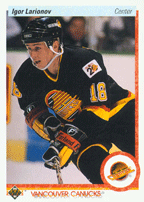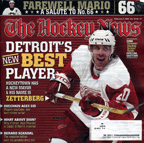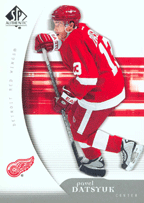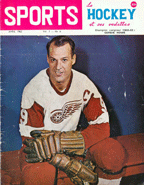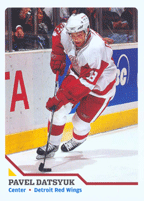| Pavel Datsyuk — Biography | |||||
| bio | facts | what they say | my say | ||
Not every NHL superstar is preordained to reach that lofty plateau. Indeed, for every Sidney Crosby or Wayne Gretzky, there is a Pavel Datsyuk, a little guy with big dreams and an unquenchable thirst for self-improvement. The All-Star center arrived in America as an obscure Russian import, and the Detroit Red Wings treated him that way. In fact, it took him nearly a half-decade just to earn a shot at an everyday job in the Motor City. But Pavel perservered—thanks in part to magician-like hands and the creativity and instincts to match. Today Pavel's name is often mentioned in the same breath as the Wings' most adored Hall of Famers. Fans in Hockey Town couldn't be happier about their small wonder. This is his story…
| |
GROWING UP
Pavel Datsyuk was born on July 20, 1978 in Yekaterinburg, Russia (formerly known as Sverdlovsk). (Click here for a complete listing of today's sports birthdays.) Pavel's hometown is Russia’s fifth largest city, located 1,000 miles east of Moscow. Yekaterinburg is famous mostly for its theatre and dance companies, poets and playwrights. It has also been home to other notable Russian hockey players, including Nikolia Khabibulin, Vladamir Malakhov and Alexei Yashin.
Pavel’s childhood had more than its fair share of rough patches. The toughest blow came when he was 12—that year, his mother passed away.
From a hockey standpoint, Pavel displayed above-average skills. But he was often underestimated or overlooked because of his smallish size. Pavel began playing for the farm club of Dynamo Yekaterinburg in the mid-1990s. Yet he was headed for an undistinguished career until Vladimir Krikunov began coaching the team.
The boy “with the twitchy walk” caught Krikunov's eye—not on the ice but on the soccer field, where Pavel’s anticipation, vision and intelligence was more obvious. Under Krikunov, Pavel developed into an efficient two-way player and began to draw wider attention among Russian hockey aficianados. Still, he went unpicked in the 1996 and 1997 NHL drafts.
After his 18th birthday, Pavel was signed to a professional contract by Spartak of the Russian Super League (RSL). The teams in the RSL represent a belt of cities throughout Russia and can be loosely compared to an elongated representation of the Minnesota Iron Range or other U.S. hockey hotbeds. After one season with Spartak, Pavel moved to Dynamo Yekaterinburg for the ’97-’98 season.
During that summer, Hakan Andersson, the Red Wings' Director of European Scouting, was sent to evaluate a player on the opposite side of the ice from Pavel and his team. Andersson reported back to the franchise that the "little guy from the other team" was worth seeing a second time. He had compared Pavel’s playmaking skills with another Russian superstar, Igor Larionov. But a storm cancelled Andersson’s flight, causing him to miss his chance to see Pavel again.
The Red Wings remained intrigued. They took a long look at Pvael ’s accomplishments, considered Andersson's review, and eventually picked him in the sixth round (171st overall) in the 1998 draft. Pavel did not report to Detroit immediately. In fact, he played five seasons in the RSL for the different teams. In 134 games (including the playoffs), he scored 30 goals. Pavel ended his RSL career with highly regarded Ak Bars Kazan in 2000–01. During this time, Pavel met and married his wife Svetlana.
ON THE RISE
The Wings were pleased with Pavel’s progress. By the fall of 2001, he was a rock-solid 5-10, and his skills had continued to evolve. Detroit decided to give him a crack at making the team, and he took full advantage. Pavel joined a club led by veteran defensemen Chris Chelios and Nicklas Lidstrom, plus high-scoring forwards Brendad Shanahan and Sergei Fedorov.
Pavel impressed head coach Scotty Bowman with his all-around talent and quiet demeanor. An injury to Steve Yzerman a third of the way through the season led to a lineup change that found Pavel centering for veterans Brett Hull and Boyd Devereaux. Pavel finished the year with 11 goals and 24 assists and was selected to play in the YoungStars Game.
The intensity and the length of the NHL schedule wore Pavel down. So did his stint midway through the year in the Olympics with the Russian hockey team (which won the bronze medal). Pavel's fatigue became noticeable. The Detroit coaching staff recognized his struggles in the face-off circle as an indication that he still had some adjusting to do regarding the rigors of the long season. At times, he was limited to three or four shifts a period.
Helping Pavel through the process were teammates Larionov and Sergei Federov, who tutored him twice a week in English. Defenseman Maxim Kuznetsov became Pavel’s roommate and main translator. The first thing the rookie memorized wasn’t his own street address or the address of the practice rink—it was Kuznetsov’s phone number. Pavel often called his teammate for directions. Usually, he needed to spell the names of streets because of his own faulty pronunciation.
Pavel and Svetlana spent hour after hourlearning English. Eventually, he developed enough commande of his second language to do interviews, with the help of Kuznetsov as translator. Pavel balanced his free time between the team’s video room and finding his way through the myriad cultural challenges that face any expatriate.
Pavel’s effort and enthusiasm made him a valuable member of the Wings in 2001-02. He tallied 39 assists in 64 games, along with a dozen goals. Pavel saw plenty of ice time in the playoffs, as Detroit set its sights on its 10th Stanley Cup. The Wings achieved their goal, and Pavel contributed with three goals and three assists.
![]()

Detroit headed into the 2002-03 season with high expectations. Over the summer, the team added Henrik Zetterberg, who replaced Devereaux on Pavel’s line. Writers dubbed the trio of Pavel, Zetterberg and Hull "two kids and an old goat." With his new linemates, Pavel posted 51 points in 64 games. A knee injury prevented him from playing a full schedule.
Pavel returned to the lineup in time for the playoffs, but the timing with Zetterberg and Hull wasn’t there. The same could be said for the entire team. The Wings were swept out of the postseason in the first round by the Anaheim Mighty Ducks.
During the off-season, Pavel became a restricted free agent. For the Wings, it wasn’t as simple as signing the Russian to a new contract. His old team, Ak Bars Kazan, wanted him back and offered him more money than Detroit. Negotiations between the three parties became mathematically and geographically complex. With the help of his agent Gary Greenstin, Pavel reached a fair compromise with Detroit. The final deal was an incentive-laden one-year deal.
Through it all, Pavel was happy to stay in Detroit. But at the same time he was wrangling his contract, Fedorov announced he was departing Detroit for Anaheim. With his new contract and healthy knees, Pavel was feeling energized and confident. In the absence of Fedorov, and with many of his teammates nursing injuries, He got off to a great start in 2003-04. By December, Pavel was third in the league in scoring.
Though older and perhaps weaker on paper than the season before, the Wings were playing far better hockey. Many pointed to Pavel as a key factor. He was a no-brainer for the All-Star team. The grind of the long season caught up with Pavel, however. He finished the regular season with 30 goals with 38 assists, but he faded down the stretch. In the playoffs, Pavel failed to notch a point. The Wings were eliminated in the Western Conference finals.
Detroit fans were eager to see what heights Pavel might achieve in his fourth season, but the campaign would have to wait. Ten years after the disastrous partial lockout of 1994-95, the NHL season was completely canceled in 2004–05. The last time the Stanley Cup had not been awarded was 1919, when the Spanish influenza forced the Montreal Canadians and the Seattle Metropolitans to stop their series in a tie.
The majority of NHL players went overseas. Indeed, more than half relocated to teams in Europe. Professional hockey teams in Russia, Sweden, Germany, Finland and the Czech Republic became flush with stars; one team in the Russian Elite league signed 11 locked-out NHL players.
Pavel returned to Russia and signed with the Avangard Omsk in Siberia. They agreed to a one-year deal, and then HC Dynamo Moscow matched Omsk’s offer. Pavel wound up playing 47 games for Dynamo and led all scorers with six postseason goals.
As the NHL approached its restart season in 2005–06, Pavel found himself in a position of considerable power. Again a restricted free agent, he chose to return to Detroit with a two-year contract for $7.8 million.
For the '05-06 season, the NHL decided to postpone the All Star Game to allow players to participate in the Winter Olympics in Turin, Italy. Pavel again earned a spot on the Russian team, which included 17 NHL players on its 22-man roster. The Russians finished fourth in the tournament, losing to the Czech Republic 3-0 in the bronze-medal game. Pavel contributed eight points (one goal, seven assists) in eight games.
Pavel had clearly become a more sophisticated player. He combined a high level of play with an air of sportsmanship. In 2005-06, for instance, he logged only 22 minutes of penalties through the entire season. The result was the first Lady Byng Memorial Trophy of his career. Pavel ended the year with his best numbers, 28 goals and 59 assists.
Entering the playoffs, the Wings were the top seed in the Western Conference. They met the Edmonton Oilers in the first round. Game 1 marked the first time Pavel had been on the ice in three weeks due to a charley horse so severe that blood had to be drained. His return had littel impact. Detroit was eliminated in six games.
Despite the team's early exit from the playoffs, Pavel was now viewed as a team leader, and he was also becoming a force in the league. Toward the end of 2006–07—a carbon-copy season of the previous one—Detroit decided to make him a cornerstone of the franchise. The Wings inked Pavel to a seven-year pact worth nearly $50 million. It was the longest contract ever handed out by the team.
With the playoffs looming and a new contract in his pocket, it was time for Pavel to plug the only hole is his NHL resume. In 42 career postseason games, he had only three goals and 15 points. In the first round, Detroit defeated the Calgary Flames in six games. Next the Wings met the San Jose Sharks and beat them in six games, too.
But again their Stanley Cup run ended in the conference finals. They fell to the Mighty Ducks, who went on the win the cup. Pavel was disappointed, but this time around he had done his part with eight goals and eight assists in 18 games.
The next season, 2007-08, Pavel was firing on all cylinders. With at least a goal or an assist in 63 of 82 games, he finished the season with a career-high 97 points (31 goals and 66 assists). His total was good for fourth overall in the league. It was the third season in a row that Pavel led the team in scoring, adding his name to the short list of other great Wings who had done so before him. Ted Lindsay, Gordie Howe and Steve Yzerman were the others.
| |
Not only did Pavel put the puck in the net, he also led the team in blocked shots. His respectful tenacity on the ice earned him enough another spot on the NHL’s All Star team. He was voted by the fans to start the game along side teammates Lindstrom and Zetterberg.
The Red Wings topped the Central Division West and entered into the playoffs again as the #1 seed. Round one paired them with the Nashville Predators. Detroit won that series in six games.
In the next round, the Wings faced Colorado. Thew swept the Avalanche in four games. In the Western Conference finals, Detroit battled the Dallas Stars for six tough games. Pavel contributed to the series win with his first NHL hat-trick in Game 3.
Detroit returned to the Stanley Cup finals for the first time since Pavel’s rookie season. Their opponent, the Pittsbught Penguins, had the most young talent in the NHL. The Wings, however, would not be denied. Detroit took the series in six games. Pavel set up two goals in the finale, won by a score of 3–2.
The 2008–09 season was another good one for Pavel and the Wings. In April , he reached the 30-goal plateau for the third time in his career. As the season wound down, he was closing in on 100 points, which would be a first for him. He was one of just a handful of NHL’s with a plus/minus of better than 30.
Pavel, the unknown kid from Sverdlovsk once considered the longest of longshots, has proven himself in the eyes of his skeptics. Those who believed in him from the beginning continue to describe what he does with adjectives such as "breathtaking" and "mesmerizing." They knew Pavel was more than a foreign import with nice moves and a head for hockey. As the rest of the hockey world has since found out, whenever he has the puck on his stick the Wings are a threat to score. Pavel has become a big-time player, even if he was a small-time prospect.
PAVEL THE PLAYER
You can’t score if you don’t have the puck. When Pavel is on the ice, the Wings’ time of possession soars. Few players in the NHL can control a game the way he does, and fewer are more difficult to knock off the puck. When Pavel scans the rink, he takes a snapshot of the action and lets it play out in his head. He seems to know where the action will take place.
An exceptional two-way player, Pavel is a heady defender and a premier set-up man. Rarely a period goes by when he doesn't give a fellow Detroit skater a clean look at the goal.
When Pavel eyes the goal, he is proficient with an entire arsenal of left-handed shots, from a hard, accurate slap shot to a lightning quick wrist shot. He is at his best when swooping in on the goalie. He sells his backhand fake so well that netminders are all but helpless. Needless to say he is practically unstoppable on penalty shots. Some say he is the NHL’s finest one-on-one player.
| Pavel Datsyuk — Biography | |||||
| bio | facts | what they say | my say | ||
© Copyright 2009 Black Book Partners, LLC. All rights reserved.
